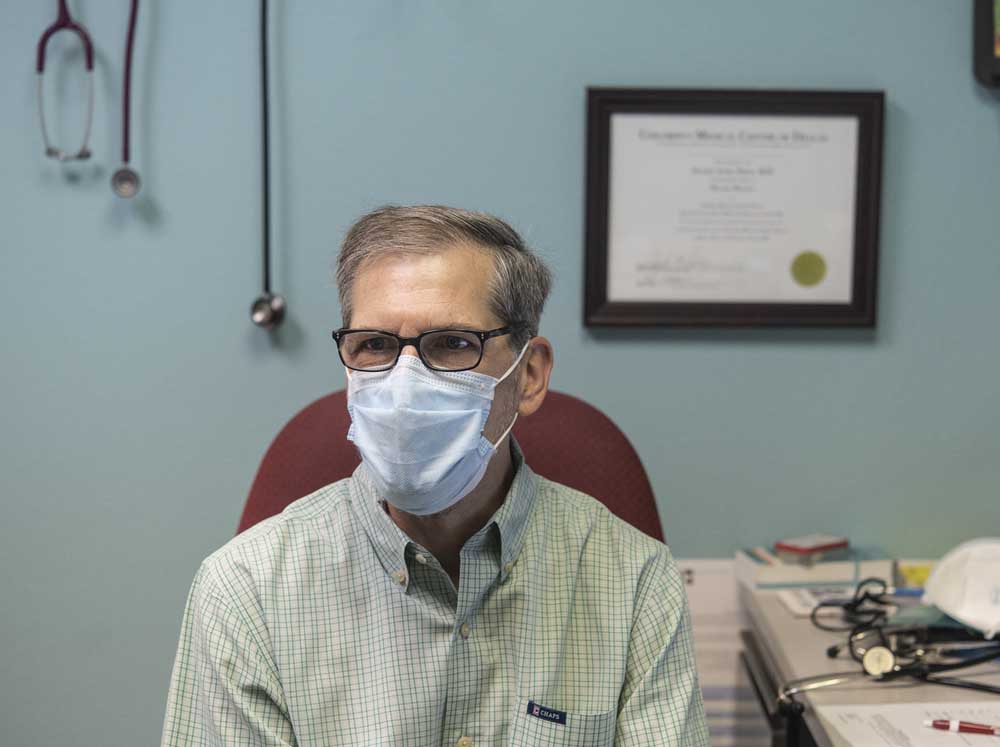TEST Amid pandemic, health experts worried about decline in vaccines among school children (copy)
Published 3:41 pm Tuesday, September 1, 2020

- Dr. Danny Price talks about the importance of routine vaccinations at St. Paul Children’s Medical Clinic in Tyler on Tuesday, Sept. 1, 2020.
Since many Texas schools have started to reopen for in-person education, experts have raised concerns about the spread of COVID-19 among children.
But another health crisis, local health officials warn, could wreak havoc among schools: an epidemic of preventable diseases.
Trending
“You just have to hope that the schools are getting it right when it comes to the safety of our kids going to school,” Sylvia Warren, head of the Northeast Texas Immunizations Coalition, said. “The school is one of those places where it is definitely high-risk for spreading COVID. And not even just COVID, but any other vaccine-preventable disease.”
Clinics like Warren’s have seen a dip in on-time immunizations and patient visits ahead of the school year, she said. By this time last year, the clinic had given out 704 more vaccinations and seen 270 more clients than in 2020.
Warren attributes the low vaccine turnout to potential fears about visiting the clinic amid the COVID-19 pandemic.
“(When) you enter a time of a pandemic when attention is taken off of these germs that are with us all the time but don’t get attention, then you could start seeing a lag in protection from those infections and have some unfortunate deaths in the background just because it’s not getting the attention that COVID is,” Dr. Danny Price, of St. Paul’s Children Clinic, said.
Children in school, Warren warns, have a high rate for passing diseases and viruses, “pandemic or not.” But with a lapse in immunizations, school children become susceptible to preventable diseases like flu, measles and chickenpox. And since there is still much unknown about how the coronavirus presents in children, Warren said, outbreaks of these diseases could prove “devastating.”
“Some of those same symptoms with coronavirus (are) the same symptoms with the flu and even other vaccine-preventable diseases,” Warren said. “That’s what’s so scary about it, especially with flu season just around the corner. People won’t know if they have COVID or if they have flu.”
Trending
Price is particularly worried about a flu outbreak — which shares symptoms with COVID-19 like a cough, body aches and fever — and how it might become “another epidemic on top of a pandemic.”
“We do expect to see more (coronavirus) cases with kids back in school, but we’re hoping it’s going to be small,” Price said. “So I guess we’ll see in the next few weeks what the result of that’s going to be.”
Since school has restarted, Warren said, they’ve seen an uptick in families coming for more vaccinations.
“They’re always waiting so late anyway, even if there wasn’t a pandemic,” Warren joked.
The problem with this swell of people, though, arises from new limitations due to COVID-19. Her clinic doesn’t have space or personnel to “see all of them like we used to see them in one day.”
Before the pandemic, Warren’s coalition would start in early spring campaigning for vaccinations in schools, radio stations and on television, she said. Often, this involved physically visiting school campuses. But this year has been “challenging,” leaving only social media outreach available to them.
“We have to just hope that people, the targeted audience that we want to see and hear what we’re saying, are listening,” Warren said.
Misinformation and stigma, Warren says, are some of the biggest obstacles to getting “anti-vax” families to get immunizations. And amid the coronavirus pandemic, there’s been no shortage of misinformation, she said.
While there is not a vaccine for COVID-19 yet, conspiracy theories have already circulated on Facebook that the vaccine could have a “government chip” or is a placebo.
“They do the same thing with the flu and other vaccines,” Warren said. “We just have to give them the right information about the vaccines.”
At her clinic, Warren says they keep vaccine literature on hand, as well as “graphic” photos of what some vaccine-preventable diseases can do to a person’s body if left untreated. She also tries to point patients to factual websites, like the Center for Disease Control and the Department of Health Services.
“It’s like a never-ending job to make people realize the importance of being vaccinated,” Warren said.
Price says his clinic also deals with “vaccine-resistant” patients, but in his experience, those families “are going to believe that conspiracy no matter what facts and figures you give them.”
Instead, he focuses on “vaccine-hesitant” families.
“Those people may want some data and information, but usually not,” Price said. “Usually what they want is a relationship they can trust. So if we can just speak openly and honestly and answer whatever questions they have and not hold back, not give leeway to any falsehoods that are out there, then we’ve found that’s the best way to handle the vaccine-hesitant families.”
“We have to be the example of it as well, we can’t tell people to take something that we’re not going to take,” Warren said. “That’s about all we can really do.”



